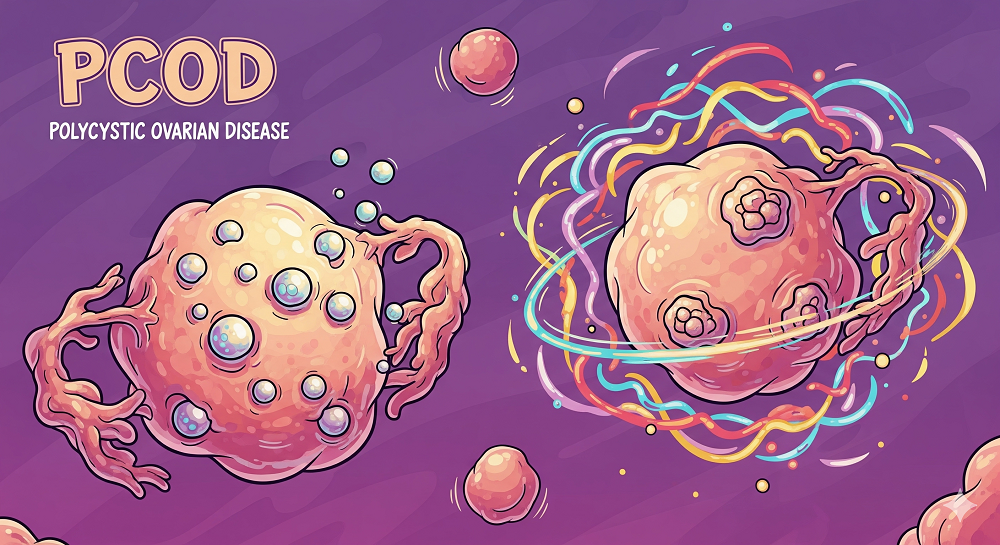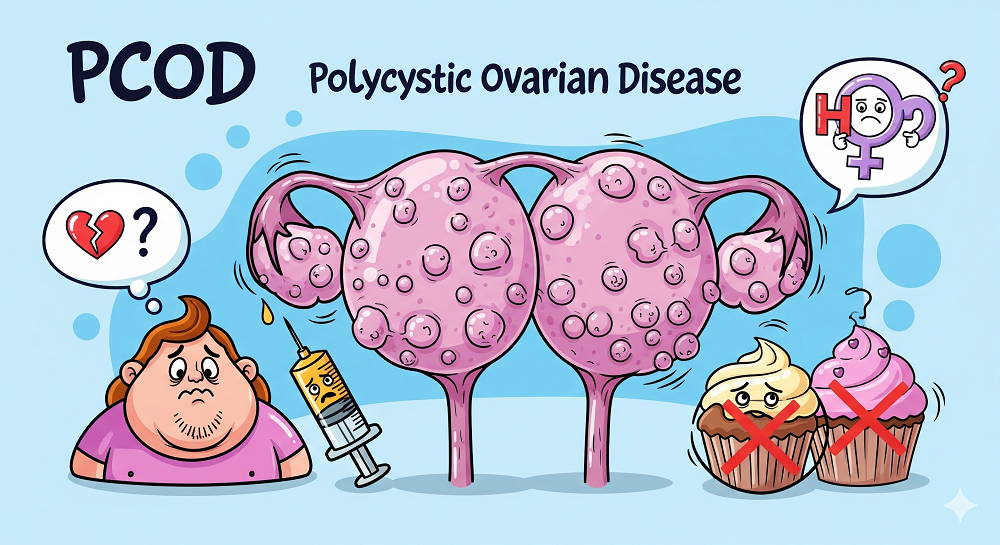
Polycystic Ovarian Disease (PCOD), also known as Polycystic Ovary Syndrome (PCOS), is one of the most common hormonal disorders affecting women of reproductive age. It is characterized by irregular periods, cysts in the ovaries, hormonal imbalance, and difficulties in conceiving. PCOD not only affects fertility but also has long-term effects on metabolism, skin, hair, and emotional well-being.
Conventional medicine often manages PCOD with hormonal pills and symptomatic treatment, but these do not always provide lasting results. Homeopathy offers a safe, natural, and holistic approach to treating PCOD by addressing the root cause and balancing the body’s hormonal system.
Understanding PCOD
The ovaries in women normally release eggs each month during the menstrual cycle. In PCOD, the ovaries produce immature eggs that remain as cysts. This leads to:
- Irregular ovulation
- Hormonal imbalance (higher levels of androgens/male hormones)
- Metabolic issues such as weight gain and insulin resistance
Symptoms of PCOD
Symptoms may vary, but the most common ones include:
Menstrual Symptoms
- Irregular periods (missed, delayed, or very heavy bleeding).
- Absence of periods (amenorrhea) in some cases.
Reproductive Symptoms
- Difficulty conceiving (infertility).
- Repeated miscarriages in some women.
Hormonal Symptoms
- Excessive hair growth on the face, chest, or abdomen (hirsutism).
- Acne and oily skin.
- Hair thinning or male-pattern baldness.
Metabolic Symptoms
- Weight gain, especially around the abdomen.
- Difficulty losing weight.
- Increased risk of diabetes and high cholesterol.
Emotional Symptoms
- Anxiety, mood swings, and depression.
- Low self-esteem due to physical changes.
Causes of PCOD

The exact cause of PCOD is not known, but several factors contribute:
- Hormonal Imbalance
- Increased androgen (male hormone) levels prevent normal ovulation.
- Imbalance in estrogen and progesterone affects the menstrual cycle.
- Insulin Resistance
- Excess insulin in the body increases androgen levels.
- Leads to obesity and metabolic disturbances.
- Genetic Factors
- PCOD often runs in families.
- A woman with a family history of PCOD, diabetes, or obesity has higher chances of developing it.
- Lifestyle Factors
- Poor diet (junk food, excess sugar, fried foods).
- Lack of exercise.
- Stress and poor sleep patterns.
Complications of PCOD
If left untreated, PCOD can lead to:
- Infertility and complications during pregnancy.
- Type 2 diabetes and insulin resistance.
- Hypertension and heart disease.
- Endometrial cancer due to prolonged absence of ovulation.
- Obesity-related issues like fatty liver.
Diagnosis of PCOD
Doctors diagnose PCOD using:
- Medical history & symptoms (irregular periods, hair growth, acne).
- Ultrasound scan (to detect ovarian cysts).
- Blood tests (hormone levels, insulin resistance, thyroid function).
Conventional Treatments for PCOD
- Hormonal Pills: To regulate periods.
- Fertility Medicines: To stimulate ovulation.
- Anti-androgen Medicines: To reduce hair growth and acne.
- Lifestyle Advice: Exercise, diet changes, and weight management.
While these can help, they often cause side effects, and symptoms may return when medications are stopped.
Homeopathy Treatment for PCOD
Homeopathy treats PCOD by understanding the root cause—whether it is hormonal imbalance, stress, lifestyle, or hereditary factors. Remedies are prescribed based on the individual’s complete health picture (physical, emotional, and genetic).
Benefits of Homeopathy for PCOD
- Restores hormonal balance naturally.
- Regulates menstrual cycles.
- Improves fertility and ovulation.
- Controls acne, hair fall, and weight issues.
- Safe, gentle, and without side effects.
- Provides long-term cure instead of temporary relief.
Lifestyle & Home Care with Homeopathy
At Aarogya Clinic, homeopathy is combined with lifestyle modifications for effective results:
Diet Recommendations
- Eat fresh fruits, vegetables, whole grains, and lean proteins.
- Avoid refined sugar, junk food, and carbonated drinks.
- Drink plenty of water to detoxify the body.
Exercise & Yoga
- Regular walking, yoga, and aerobic exercises improve metabolism.
- Specific yoga poses like Bhujangasana and Setu Bandhasana help regulate hormones.
Stress Management
- Meditation, deep breathing, and adequate sleep help balance hormones.
- Reducing stress improves menstrual regularity.
Weight Management
- Even 5–10% weight loss can improve symptoms significantly.
Prevention of PCOD
- Maintain a healthy weight.
- Follow a balanced diet.
- Exercise regularly.
- Manage stress effectively.
- Go for regular health check-ups if there is a family history of PCOD.
PCOD is a growing concern among women today due to lifestyle changes, stress, and hormonal imbalances. While conventional treatments may offer temporary relief, homeopathy provides a holistic, natural, and long-term solution. With remedies like Pulsatilla, Sepia, Calcarea Carbonica, and Thuja, combined with lifestyle changes, women can overcome PCOD and lead a healthy, fulfilling life.


